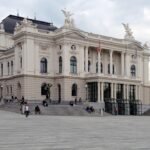Wondering when to go to Brussels without running into huge crowds or bad weather? Choosing the right time to visit this vibrant city can make all the difference in your experience. The timing really depends on a few factors like the weather, your budget, local events, and what you want to do during your trip. So, if you've been asking yourself, “Kapan sih waktu terbaik ke Brussels?”, let's explore this beautiful city throughout the year!
Overview of Brussels’s Climate
Brussels has a temperate maritime climate, which means you can expect mild winters and cool summers. However, it's not known for extreme weather. The weather in Brussels tends to be a mix of dry and wet days, depending on the season. The average temperature in Brussels varies from the chilly lows of about 3°C (37°F) in winter to the pleasant highs of around 23°C (73°F) during summer.
Generally, the city's weather is quite unpredictable, so it's wise to keep an umbrella handy. Rainfall can be scattered throughout the year, with no truly “dry season.” This is particularly important to consider when planning your travel wardrobe!
Month-by-Month or Seasonal Breakdown
Spring (March to May)
Weather: Spring is a lovely time in Brussels, with average temperatures rising from 9°C (48°F) in March to about 18°C (64°F) in May. Expect a mix of sunny and rainy days.
Events: The famous Brussels Flower Carpet occurs in August, but during spring, you can enjoy the gorgeous blooming of tulips in various parks around the city.
Pros: Great for budget travelers! Hotel prices are relatively low, and you can enjoy the city's sights without long queues.
Cons: Early spring can still be chilly and is occasionally rainy.
Best for: Those looking to enjoy nature, artists, and anyone wanting a quieter experience.
Summer (June to August)
Weather: Summer can get warm, with temperatures ranging from 15°C (59°F) to 25°C (77°F). The days are long and generally sunny.
Events: Numerous festivals pop up throughout the summer, including Brussels Beer Weekend and the Jazz Marathon, making it a lively time to visit.
Pros: Ideal for outdoor activities, sightseeing, and enjoying al fresco dining.
Cons: This is the peak tourist season, resulting in crowds at major attractions and higher hotel prices.
Best for: Families and those looking to soak up some sun while enjoying vibrant city life.
Fall (September to November)
Weather: Fall sees temperatures gradually dropping from around 20°C (68°F) in September to about 10°C (50°F) by November.
Events: The busy pace slows down, but you can experience the Brussels Gallery Weekend in September, showcasing local artists.
Pros: The city is less crowded than in summer, and prices start to drop as well.
Cons: You might encounter more rain, especially in late autumn.
Best for: Culture enthusiasts and travelers seeking a more laid-back experience.
Winter (December to February)
Weather: Winter brings cold temperatures, ranging from -1°C (30°F) to 7°C (45°F). Snow can occasionally blanket the city, adding a magical touch.
Events: Don't miss the festive Christmas markets and lights that adorn the city during this time!
Pros: Winter can be one of the most beautiful times to see Brussels, with less tourist traffic.
Cons: It can be quite chilly, and some attractions may have reduced hours.
Best for: Couples seeking a romantic getaway or travelers interested in holiday festivities.
Tips Based on Travel Style
For Budget Travelers
If you're looking to save some cash, consider visiting in late autumn (September to November). This is often when hotel rates drop, and you'll avoid the tourist crowds. Plus, the weather in Brussels during this time is still pleasantly mild.
For Avoiding Crowds
The best time to avoid crowds is during the early spring (March-April) or late fall (mid-October-November). You'll get to explore iconic spots without the hustle and bustle typical of summer months.
For Outdoor Activities
Summer is clearly the ideal time for enjoying outdoor activities. Whether it's cycling through the city parks or lounging in the lovely Brussels squares, the warm weather makes everything a delight.
For Cultural Events
If immersing yourself in the culture is your thing, aim for late spring or summer. Not only will you catch special festivals and street events, but the atmosphere is electric during these months.
For Romantic or Solo Trips
Transcending the typical tourist vibe, winter brings a serene and romantic ambiance, perfect for a cozy getaway. The twinkling Christmas lights can cast a lovely glow on the cobblestone streets, making it perfect for a romantic stroll.
It really depends on what kind of experience you're looking for. Some travelers love March because of the quiet vibe and blooming scenery, while others aim for the festivals in July. Each season offers a different side of Brussels, ensuring there's always something to experience!
FAQs
Is March a good time to visit Brussels?
Yes! Early spring offers mild weather and fewer tourists, although it may still be a bit wet.
When is the rainy season in Brussels?
Brussels is known for its sporadic rain throughout the year, but the wettest months tend to be July and August.
What's the cheapest time to visit Brussels?
Late autumn (November) and early spring (March) are often the cheapest months for travel and accommodations.
What's the peak season in Brussels?
Summer (June through August) is the peak season, with many tourists flocking to the city for festivals and warm weather.
Brussels is a city that captivates its visitors no matter the time of year. Whether you're out to explore cultural treasures or just relax with a good meal and a glass of Belgian beer, there's no wrong time to visit this remarkable capital!








